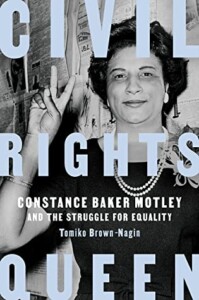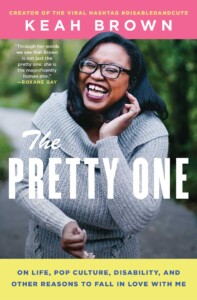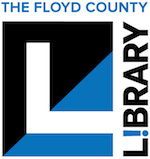Today is the last day of Black History Month, and tomorrow is the first day of Women’s History Month. There’s a big overlap between the communities we lift up at these times– Black women! Dr. Kimberlé Crenshaw coined the term “intersectionality” to describe the way identities stack– Black women are Black and they are also women, so they live at the “intersection” of Blackness and womanhood, and deserve space in both months! To observe that transition, I am taking time today to highlight Black women.
 First up is Contsance Baker Motley, subject of the new book Civil Rights Queen. Born to an aspirational blue-collar family during the Great Depression, Constance Baker Motley was expected to find herself a good career as a hair dresser. Instead, she became the first black woman to argue a case in front of the Supreme Court, the first of ten she would eventually argue. The only black woman member in the legal team at the NAACP’s Inc. Fund at the time, she defended Martin Luther King in Birmingham, helped to argue in Brown vs. The Board of Education, and played a critical role in vanquishing Jim Crow laws throughout the South. She was the first black woman elected to the state Senate in New York, the first woman elected Manhattan Borough President, and the first black woman appointed to the federal judiciary. Building on an extraordinary wealth of research, Tomiko Brown-Nagin, an award-winning, esteemed civil rights and legal historian and dean of the Radcliffe Institute, compels us to ponder some of our most timeless and urgent questions. How do the historically marginalized access the corridors of power? What is the price of the ticket? How does access to power shape individuals committed to social justice?
First up is Contsance Baker Motley, subject of the new book Civil Rights Queen. Born to an aspirational blue-collar family during the Great Depression, Constance Baker Motley was expected to find herself a good career as a hair dresser. Instead, she became the first black woman to argue a case in front of the Supreme Court, the first of ten she would eventually argue. The only black woman member in the legal team at the NAACP’s Inc. Fund at the time, she defended Martin Luther King in Birmingham, helped to argue in Brown vs. The Board of Education, and played a critical role in vanquishing Jim Crow laws throughout the South. She was the first black woman elected to the state Senate in New York, the first woman elected Manhattan Borough President, and the first black woman appointed to the federal judiciary. Building on an extraordinary wealth of research, Tomiko Brown-Nagin, an award-winning, esteemed civil rights and legal historian and dean of the Radcliffe Institute, compels us to ponder some of our most timeless and urgent questions. How do the historically marginalized access the corridors of power? What is the price of the ticket? How does access to power shape individuals committed to social justice?
 The next Black woman on our list is Jayne Allen, author of the gorgeous novel Black Girls Must Die Exhausted, the first in a trilogy (the second book, Black girls Must Be Magic, is out now, with the third and final coming net year). Tabitha Walker is a black woman with a plan to “have it all.” At 33 years old, the checklist for the life of her dreams is well underway. Education? Check. Good job? Check. Down payment for a nice house? Check. Dating marriage material? Check, check, and check. With a coveted position as a local news reporter, a “paper-perfect” boyfriend, and even a standing Saturday morning appointment with a reliable hairstylist, everything seems to be falling into place. Then Tabby receives an unexpected diagnosis that brings her picture-perfect life crashing down, jeopardizing the keystone she took for granted: having children. With her dreams at risk of falling through the cracks of her checklist, suddenly she is faced with an impossible choice between her career, her dream home, and a family of her own. With the help of her best friends, the irreverent and headstrong Laila and Alexis, the mom jeans-wearing former “Sexy Lexi,” and the generational wisdom of her grandmother and the nonagenarian firebrand Ms. Gretchen, Tabby explores the reaches of modern medicine and tests the limits of her relationships, hoping to salvage the future she always dreamed of. But the fight is all consuming, demanding a steep price that forces an honest reckoning for nearly everyone in her life. As Tabby soon learns, her grandmother’s age-old adage just might still be true: Black girls must die exhausted.
The next Black woman on our list is Jayne Allen, author of the gorgeous novel Black Girls Must Die Exhausted, the first in a trilogy (the second book, Black girls Must Be Magic, is out now, with the third and final coming net year). Tabitha Walker is a black woman with a plan to “have it all.” At 33 years old, the checklist for the life of her dreams is well underway. Education? Check. Good job? Check. Down payment for a nice house? Check. Dating marriage material? Check, check, and check. With a coveted position as a local news reporter, a “paper-perfect” boyfriend, and even a standing Saturday morning appointment with a reliable hairstylist, everything seems to be falling into place. Then Tabby receives an unexpected diagnosis that brings her picture-perfect life crashing down, jeopardizing the keystone she took for granted: having children. With her dreams at risk of falling through the cracks of her checklist, suddenly she is faced with an impossible choice between her career, her dream home, and a family of her own. With the help of her best friends, the irreverent and headstrong Laila and Alexis, the mom jeans-wearing former “Sexy Lexi,” and the generational wisdom of her grandmother and the nonagenarian firebrand Ms. Gretchen, Tabby explores the reaches of modern medicine and tests the limits of her relationships, hoping to salvage the future she always dreamed of. But the fight is all consuming, demanding a steep price that forces an honest reckoning for nearly everyone in her life. As Tabby soon learns, her grandmother’s age-old adage just might still be true: Black girls must die exhausted.
 Our last stop (for this blog post, at least!) is with Keah Brown, author of The Pretty One. March is also Disability Awareness Month, so this is a good time to highlight the creator of the viral hashtag #DisabledAndCute. Keah Brown loves herself, but that hadn’t always been the case. Born with cerebral palsy, her greatest desire used to be normalcy and refuge from the steady stream of self-hate society strengthened inside her. But after years of introspection and reaching out to others in her community, she has reclaimed herself and changed her perspective. In The Pretty One, Brown gives a contemporary and relatable voice to the disabled–so often portrayed as mute, weak, or isolated. With clear, fresh, and light-hearted prose, these essays explore everything from her relationship with her able-bodied identical twin (called “the pretty one” by friends) to navigating romance; her deep affinity for all things pop culture–and her disappointment with the media’s distorted view of disability; and her declaration of self-love, a message she hopes to share with people in all types of bodies.
Our last stop (for this blog post, at least!) is with Keah Brown, author of The Pretty One. March is also Disability Awareness Month, so this is a good time to highlight the creator of the viral hashtag #DisabledAndCute. Keah Brown loves herself, but that hadn’t always been the case. Born with cerebral palsy, her greatest desire used to be normalcy and refuge from the steady stream of self-hate society strengthened inside her. But after years of introspection and reaching out to others in her community, she has reclaimed herself and changed her perspective. In The Pretty One, Brown gives a contemporary and relatable voice to the disabled–so often portrayed as mute, weak, or isolated. With clear, fresh, and light-hearted prose, these essays explore everything from her relationship with her able-bodied identical twin (called “the pretty one” by friends) to navigating romance; her deep affinity for all things pop culture–and her disappointment with the media’s distorted view of disability; and her declaration of self-love, a message she hopes to share with people in all types of bodies.
If you have a favorite book by or about Black women (honorable mentions to Wayward Lives, Beautiful Experiments and We Were There), let us know!
